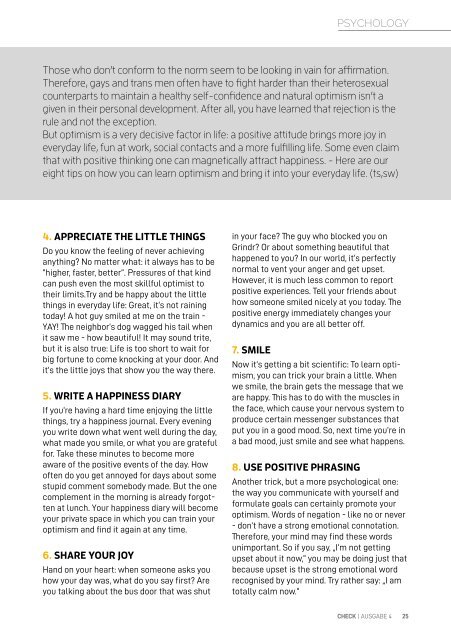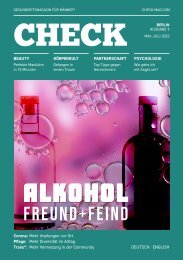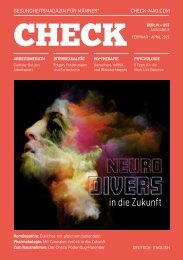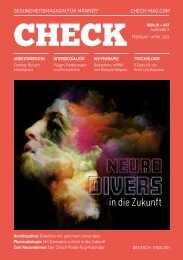CHECK Magazin - Gesundheitsmagazin für Männer No.4
Die Verschmutzung des Planeten findet aber auch im Kleinen statt und betrifft uns ganz direkt. Denn täglich nehmen wir unzählige Gifte durch die Nahrung, Kosmetik oder Alltagsgegenstände in uns auf. Welches sind die größten Gefahren und wie kann man sich im Alltag davor schützen?
Die Verschmutzung des Planeten findet aber auch im Kleinen statt und betrifft uns ganz direkt. Denn täglich nehmen wir unzählige Gifte durch die Nahrung, Kosmetik oder Alltagsgegenstände in uns auf. Welches sind die größten Gefahren und wie kann man sich im Alltag davor schützen?
Sie wollen auch ein ePaper? Erhöhen Sie die Reichweite Ihrer Titel.
YUMPU macht aus Druck-PDFs automatisch weboptimierte ePaper, die Google liebt.
PSYCHOLOGY<br />
Those who don’t conform to the norm seem to be looking in vain for affirmation.<br />
Therefore, gays and trans men often have to fight harder than their heterosexual<br />
counterparts to maintain a healthy self-confidence and natural optimism isn’t a<br />
given in their personal development. After all, you have learned that rejection is the<br />
rule and not the exception.<br />
But optimism is a very decisive factor in life: a positive attitude brings more joy in<br />
everyday life, fun at work, social contacts and a more fulfilling life. Some even claim<br />
that with positive thinking one can magnetically attract happiness. - Here are our<br />
eight tips on how you can learn optimism and bring it into your everyday life. (ts,sw)<br />
4. APPRECIATE THE LITTLE THINGS<br />
Do you know the feeling of never achieving<br />
anything? No matter what: it always has to be<br />
“higher, faster, better”. Pressures of that kind<br />
can push even the most skillful optimist to<br />
their limits.Try and be happy about the little<br />
things in everyday life: Great, it‘s not raining<br />
today! A hot guy smiled at me on the train -<br />
YAY! The neighbor‘s dog wagged his tail when<br />
it saw me - how beautiful! It may sound trite,<br />
but it is also true: Life is too short to wait for<br />
big fortune to come knocking at your door. And<br />
it’s the little joys that show you the way there.<br />
5. WRITE A HAPPINESS DIARY<br />
If you‘re having a hard time enjoying the little<br />
things, try a happiness journal. Every evening<br />
you write down what went well during the day,<br />
what made you smile, or what you are grateful<br />
for. Take these minutes to become more<br />
aware of the positive events of the day. How<br />
often do you get annoyed for days about some<br />
stupid comment somebody made. But the one<br />
complement in the morning is already forgotten<br />
at lunch. Your happiness diary will become<br />
your private space in which you can train your<br />
optimism and find it again at any time.<br />
6. SHARE YOUR JOY<br />
Hand on your heart: when someone asks you<br />
how your day was, what do you say first? Are<br />
you talking about the bus door that was shut<br />
in your face? The guy who blocked you on<br />
Grindr? Or about something beautiful that<br />
happened to you? In our world, it‘s perfectly<br />
normal to vent your anger and get upset.<br />
However, it is much less common to report<br />
positive experiences. Tell your friends about<br />
how someone smiled nicely at you today. The<br />
positive energy immediately changes your<br />
dynamics and you are all better off.<br />
7. SMILE<br />
Now it‘s getting a bit scientific: To learn optimism,<br />
you can trick your brain a little. When<br />
we smile, the brain gets the message that we<br />
are happy. This has to do with the muscles in<br />
the face, which cause your nervous system to<br />
produce certain messenger substances that<br />
put you in a good mood. So, next time you‘re in<br />
a bad mood, just smile and see what happens.<br />
8. USE POSITIVE PHRASING<br />
Another trick, but a more psychological one:<br />
the way you communicate with yourself and<br />
formulate goals can certainly promote your<br />
optimism. Words of negation - like no or never<br />
- don’t have a strong emotional connotation.<br />
Therefore, your mind may find these words<br />
unimportant. So if you say, „I‘m not getting<br />
upset about it now,“ you may be doing just that<br />
because upset is the strong emotional word<br />
recognised by your mind. Try rather say: „I am<br />
totally calm now.“<br />
<strong>CHECK</strong> | AUSGABE 4<br />
25


















